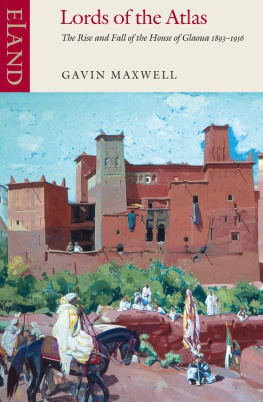For queries on an empty page;
For rams and expiated sin;
For desert dust and falcons cry.
For tempest in a ruined inn.
For sunrise, and the mountains age
A vulture on the sky.
Contents
T HE PREPARATION OF THIS BOOK has involved a great deal of research over a period of several years. What written information is available is scattered throughout a very large number of French books and documents, most of them not easy of access; the references are fragmentary, too, so that the production of a narrative has been like collecting and assembling widely dispersed pieces of a jigsaw puzzle. The literature in English is meagre and for the most part trivial, (with the exception of Rom Landaus Moroccan Drama), but early on in my reading I chanced upon the late Mr Walter Harriss Morocco That Was, published by Blackwoods in 1912. Mr Harris was Times correspondent in Morocco from before the turn of the century until after the establishment of the French Protectorate; he could, and often did, pass as an Arab, and enjoyed the personal friendship of several Sultans. While his book covers a period of less than twenty years, and is mainly anecdotal and episodic, I realised at once that to use his information while changing his words would be unthinkable; for his style, both moving and hilariously satirical, must have been unique in his epoch. I therefore approached his nephew and literary executor, Mr Peter Harris, who has been generous enough to allow me to reproduce long extracts verbatim. This I have done, not always in sequence, cementing them, as it were, by factual material from other sources. Thus all passages in Book One that are placed between inverted commas are his unless otherwise acknowledged. It has, in fact since the book was short proved possible to use the greater part of his text, and I am sure that many will share my pleasure in the republication after so many years of a neglected virtuoso.
A select list of published sources is given at the end of this book. Beyond this I have relied upon a great bulk of verbal communication and unpublished notes that have been made available to me; these, at the request of the donors, I have not acknowledged to individuals, but I express my great appreciation of the time and trouble they have given to my project.
Any biography of a ruler necessarily involves consideration of much of his countrys contemporary history, and it is difficult for the biographer to determine at what point to arrest examination of an outside sequence of events that may have affected his subject. Thus, for example, the Istiqlal or Moroccan Independence Movement merits a separate volume at least as long as the present one, and discussion of the Arab Berber problem in Morocco has had to be kept to the minimum for understanding of the narrative. The select bibliography is crammed with tangential fact, which may be described as further reading.
I am indebted to Lord Brockway for allowing me to reproduce his letter published in the Manchester Guardian on 10 June 1953; and to the Trustees of the late Agnes, Lady Grove for permission to quote extracts from her Seventy-one days Camping in Morocco.
The decorations in the text were drawn for this book by Ahmed Ben Lahcen Tija, a Berber from Marrakesh, originally of the Haha tribe.
BOOK ONE
| 1893 | The Sultan Moulay Hassan, returning from a punitive war in the South, presents the tribal chieftain Madani El Glaoui with a Krupp cannon. |
| 1894 | Death of the Sultan Moulay Hassan, and accession of his child son Moulay Abd El Aziz. Regency of Hassans ex-Chamberlain Bou Ahmed. |
| 1900 | Death of Bou Ahmed; beginning of the Court frivolities. |
| 1902 | Appearance of the Pretender Bou Hamara. Madani El Glaoui fights Bou Hamara and is beaten at Taza. |
| 1907 | Murder of Dr Mauchamp in Marrakesh; French occupation of Oujda.
Murder of Europeans in Casablanca; French landings.
Madani El Glaoui declares for the Sultans brother Moulay Hafid, and proclaims him Sultan.
Defeat of Moulay Abd El Aziz by Madani and Moulay Hafid. Hafid becomes Sultan; Madani becomes Grand Vizier, his brother Thami Pasha of Marrakesh. |
| 1908 | Continued French penetration. |
| 1909 | Mohammed El Kittani flogged to death at the orders of the Sultan, on charges of sedition.
The Pretender Bou Hamara captured and executed. |
| 1911 | Northern tribes revolt against the Sultan Moulay Hafid, French occupy Fez.
Hafid dismisses Madani El Glaoui from post of Grand Vizier and Thami El Glaoui from post of Pasha of Marrakesh.
Temporary fall of the Glaoui regime.
The Mtouggi becomes ruler of the South. |
| 1912 | Treaty of Fez, giving France virtual control of Morocco. Hafid abdicates.
The Pretender El Hiba is declared Sultan at Tiznit by the Southern tribes.
Hiba occupies Marrakesh, and takes European hostages.
French troops march on Marrakesh; Hiba defeated. Thami El Glaoui delivers the hostages to the French, and is declared by them Pasha of Marrakesh. Moulay Youssef declared Sultan, with French connivance. |
| 19121914 | French use El Glaoui, El Mtouggi and El Goundafi to conquer the Southern tribes. |
| 1914 | Outbreak of World War I. Madani El Glaoui swears allegiance of his family and that of El Mtouggi and El Goundafi to France. |
| 19141918 | Subjugation of the South continues under these three. |
| 1918 | Madanis favourite son, Abd El Malek, killed in battle against Southern tribes. |
| 1918 | Madani dies; his place as chief ally of the French is taken by his brother Thami, Pasha of Marrakesh. |
BOOK TWO
| 1918 | Thami El Glaoui, Pasha of Marrakesh, nominated by the French as head of the Glaoui family. But his nephew-in-law Hammou remains Caid of Telouet and in control of great lands beyond the Atlas, and shows himself strongly anti-French. |
| 1922 | End of Thamis strictly military career. |
| 1924 | End of El Goundafis fief. |
| 1927 | Death of the Sultan Moulay Youssef, and accession of his younger son Moulay Mohammed V. |
| 1928 | End of El Mtouggis fief. |
| 1930 | Early stirrings of the Independence Movement; French reply with the Berber dahir, aimed at dividing the Arab and Berber populations. |
| 1932 | Publication of Son Excellence, a violent attack upon the power and personal character of Thami El Glaoui. |
| 1934 | Hammou El Glaoui dies, and Thami consolidates the Glaoui Empire. |
| 1935 | Pacification of the South officially completed. |
| 1937 | French exile leaders of the Independence Movement. |
| 1939 | Outbreak of World War II. The Sultan Mohammed V swears allegiance to France until she is victorious, though by now he aspires to an independent Morocco. |
| 1943 | Casablanca Conference (Roosevelt, Churchill, de Gaulle, etc.). Roosevelt has private meeting with the Sultan, and expresses himself in sympathy with the Independence Movement. |
| 1944 | Gabriel Puaux becomes Resident-General in Morocco. Further arrests of Independence Movement leaders. Riots and repressive measures. |
| 1946 | Erick Labonne succeeds Gabriel Puaux. Independence Movement leaders freed. |
| 1947 | Riot and massacre in Casablanca. The Sultans speech at Tangier. General Juin replaces Erick Labonne. French pursue repressive policy. |










